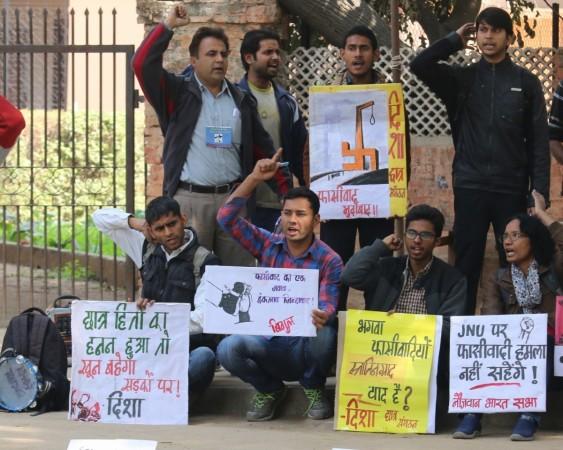
The row over Jawaharlal Nehru University's event organised by the students union to observe 2001 Parliament attack convict Afzal Guru's third death anniversary is the "new, ugly face" of Prime Minister Narendra Modi's India, a Pakistani daily reported on Tuesday.
The editorial of the News International criticised the Indian government over the arrest of JNU students' union leader Kanhaiya Kumar on charges of sedition and criminal conspiracy. It said that "dissenters" have been forced "to prove their loyalty and show they are not agents of foreign forces."
"The new, ugly face of Modi's India can be seen in the reaction to the row over protests at the Jawaharwal Nehru University..." the editorial read.
"In a stunning suppression of dissent, police have even arrested the head of the JNU student's union for participating in the protest... Perhaps the worst reaction came from Home Minister Rajnath Singh," it added.
The piece attacked Singh for reaching a "ludicrous conclusion" by blaming Pakistan-based Lashkar-e-Taiba founder Hafiz Saeed for the event that unfolded at the campus on Feb. 9 "based on a tweet by a fake Hafiz Saeed account."
"The BJP government has shown it has no respect for India's secularist traditions. The official narrative is that anyone who doubts the course of justice was properly followed in the Afzal case can now be jailed for voicing that opinion."
JNU students' union leader Kumar has been sent to police custody till Feb. 17. He was arrested on Friday for organising the event to commemorate the hanging of Guru on Feb. 9, 2013 and shouting anti-India slogans. University teachers and students have come out in support of Kumar, criticising his arrest.
What is sedition law?
Sedition is a colonial era law that comes under Section 124A the Indian Penal Code.
"Whoever, by words, either spoken or written, or by signs, or visible representation, or otherwise, brings or attempts to bring into hatred or contempt, or excites or attempts to excite dissatisfaction towards the Government established by law in [India], shall be punished with [imprisonment for life] to which fine may be added, or with imprisonment which may extend to three years, to which fine may be added, or with fine.
Explanation 1 — The expression "disaffection" includes disloyalty and all feelings of enmity.
Explanation 2 — Comments expressing disapprobation of the measures of the attempting to excite hatred, contempt or disaffection, do not constitute an offence under this section.
Explanation 3 — Comments expressing disapprobation of the administrative or other action of the Government without exciting or attempting to excite hatred, contempt or disaffection, do not constitute an offence under this section."
Source: Live Mint.









